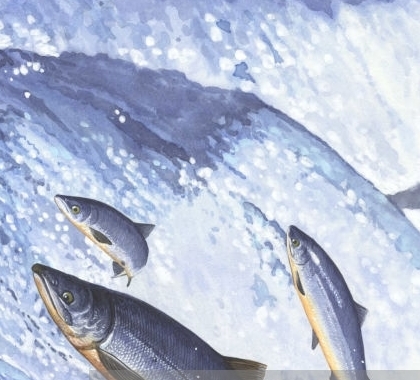The U.S. Food and Drug Administration (FDA) has decided to permit Massachusetts biotech firm AquaBounty to begin importing genetically modified Atlantic salmon eggs to be raised at its private, land-based facilities.
When they mature and are harvested and sold, the salmon will become the first genetically modified organism (GMO) animal raised for human consumption in the United States.
The FDA initially approved AquaBounty’s plan to import its GMO salmon in 2015, but in the face of a number of legal challenges filed by environmental groups opposed to GMO food, and other regulatory issues which arose, the agency placed an alert on the salmon, resulting in a temporary halt to the importation of the eggs.
FDA has now lifted the alert, saying the salmon has undergone safety reviews and will meet labeling requirements to distinguish AquaBounty’s GMO salmon from other wild and farm-raised salmon and disclose it as genetically modified.
Touting Efficiency, Eco-Friendliness
AquaBounty is currently raising and selling the salmon in smaller quantities in Canada, and it says entering the U.S. market will allow the company to provide the world’s most sustainable salmon, raised and harvested entirely in North America with a smaller environmental footprint than traditional salmon farming or commercial harvesting on the open ocean.
The bioengineered fish are almost identical to traditional salmon but grow to maturity twice as fast, meaning they can be harvested and replenished much more quickly. Raised in controlled, land-based facilities and bred to be sterile, the fish are incapable of affecting wild salmon communities.
If the public accepts and embraces AquaBounty’s GMO salmon, it could reduce the commercial take of wild salmon, helping declining populations to recover.
Economic Boon to Communities
FDA’s thorough review process has shown AquaBounty’s salmon are safe and nourishing, said Sylvia Wulf, AquaBounty’s CEO, in a statement announcing FDA’s decision to lift the alert.
“As FDA noted in their announcement, our salmon was approved by the agency over three years ago based upon a very comprehensive, science-based review process, which established that our salmon was safe, nutritious, and environmentally sound and met all other regulatory requirements,” Wulf’s statement said.
AquaBounty’s salmon production will create jobs and boost local economies, says Wulf.
“We will immediately start the process of importing AquAdvantage eggs from our hatchery in Canada to begin growing at our Indiana facility, and we are moving forward with plans to grow and commercialize our salmon at our facility[ies] in Albany, Indiana and Rollo Bay, Prince Edward Island, Canada,” Wulf said in a statement provided to Environment & Climate News. “We will be putting AquAdvantage Salmon eggs into these facilities as soon as possible and look forward to harvesting these fish in the fall of 2020.
“Once we are in full production, the two facilities combined will produce about 1,500 metric tons of salmon annually,” said Wulf. “AquaBounty has begun the staffing process for both facilities, and as we continue to staff and work with the rural communities where we are located, we will attract young talent with well-paying jobs, further strengthening the economy and our ties to these communities.”
Approval ‘Far Too Long in Coming’
If bioengineered foods can be brought to market, it could reduce the agriculture industry’s impact on the environment, says Bonner Cohen, a senior fellow at the National Center for Public Policy Research.
“Bioengineered animals can often be grown faster, with less impact to environmental resources, and closer to the source of consumption than traditionally raised animal foods, resulting in less fuel use for transportation and allowing for greater sustainability,” Cohen said.
The slow-moving regulatory approval process has almost strangled the nascent GMO food industry in its infancy, says Dr. Henry Miller, a senior fellow with the Pacific Research Institute.
“This final approval for production and sale of the AquAdvantage salmon in the United States was far too long in coming,” said Miller. “FDA’s policy of treating genetically engineered animals as a ‘new animal drug’ and its incompetent implementation—including a 20-plus-year review of the salmon—have virtually destroyed an entire, once-promising sector of biotechnology.
“The genetic engineering of animals could produce the ‘Next Big Thing’ in animal husbandry,” Miller said.
Sarah Lott ([email protected]) writes from Rowlett, Texas.

